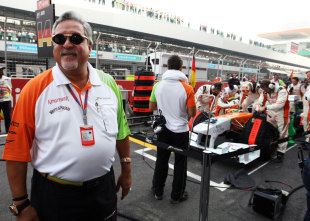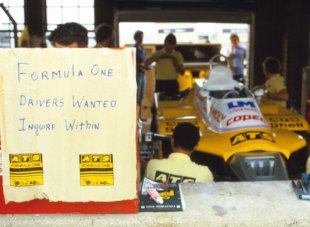- Maurice Hamilton's F1 blog
Protests are not what they used to be

- Race:
- Indian Grand Prix
There's been a suggestion that employees of Kingfisher Airlines might use this weekend's Indian Grand Prix to express their displeasure over the not insignificant matter of an alleged failure by the company to pay wages for the past couple of months.
Kingfisher is owned by Vijay Mallya, who also happens to have the Sahara Force India F1 team on his roster of business interests. It makes sense, therefore, to use the high profile of a Grand Prix to bring attention to your grievance, not to mention causing embarrassment for Mr. Mallya among his fellow team principals.
F1 is such a competitive business that any team worth its salt wishes to avoid providing rivals with a reason to smirk, never mind suffer the destabilising effect of having a vociferous reception committee at the circuit fence telling the world that you're a tight-arse at best and grossly negligent or incompetent at worst. F1 is all about being seen to be in control and coping beautifully even though, beneath the smooth surface of the paddock, your little feet are paddling like crazy.
This being India, however, the one thing Mr. Mallya has in his favour is that mild chaos is part and parcel of daily life in this extraordinary country. A few people shouting the odds at the front gate is simply another obstacle to overcome after having met a cow in the slow lane of the motorway or a ramshackle truck heading out of the gloom towards you in the fast lane.
Grands Prix have had their moments of political tension in the past, but not as many as you might expect given the presence of television cameras and the world's media. The shambolic handling of this year's Bahrain Grand Prix led to much-publicised trouble but the race itself was largely unaffected. This has much to do with F1 security being so tight that a British internet geek in his bedroom has more chance of breaking into the Pentagon's database than a person without one of Mr Ecclestone's passes has of getting within shouting distance of the F1 paddock.
There have been a few cases of the police turning up in the paddock to confiscate trucks and hardware in lieu of money owed to a local businessman or a wannabe driver who was promised the F1 earth but failed to get past Go in return for a large bag of cash.
At Monza in 2007 you may remember that the Italian police turned up at the McLaren motor home at the height of the Spygate scandal. The purpose was to notify four McLaren team members that they were the subject of civil inquiry - a fact the McLaren team were well aware of. Evidence that this was for show and the destabilising influence mentioned previously became clear when beaming officers of the law emerged from the Brand Centre refreshed by excellent catering and clutching McLaren caps and a bag of goodies. But, by then, The Sunday Times (no less) had carried the headline 'Police swoop on McLaren'. Job done.
If you're talking about protests at the gate, then arguably the most successful was at Kyalami in 1982. The South African GP, being the first race of the season, became the focus of concern over contracts the drivers - well, most of them - had signed to give their respective teams more rights than Niki Lauda felt was healthy for any self-respecting driver wishing to control his own future.
This was the first race of Lauda's comeback. The two-year absence flying his aircraft had clearly rid the then twice-world champion of any fear of reprisal from the F1 authorities as he organised a coach and herded all 31 drivers onto it as they arrived for the first day of work. Then he told the driver to take the party on a nice trip to a Johannesburg hotel, where they shut themselves in a function room and refused to come out until the teams saw sense.

The stand-off lasted through the night, the drivers (minus a couple of escapees who scuttled back to their bosses) sleeping on mattresses and entertaining themselves by a variety of methods ranging from Gilles Villeneuve playing Scott Joplin on a grand piano to Bruno Giacomelli giving an impromptu lecture on terrorism.
In the end, agreement was reached and the offending clause amended, but not before a couple of the drivers were reprimanded and licences suspended for being naughty boys.
Can you imagine such a thing happening today? The coach wouldn't get beyond the first security check a mile from the track and the drivers would have to deal with their minders and PR people bursting into tears if left alone by the side of the road.
Mr. Mallya may feel things look grim this weekend, but 30 years ago his employees would have commandeered the Force India hospitality area by now, liked what they saw and decided to move in permanently. Meanwhile, wheels from the F1 car would have been sold and fitted to a fleet of tuk-tuks in downtown New Dehli. Protests definitely aren't what they used to be.

